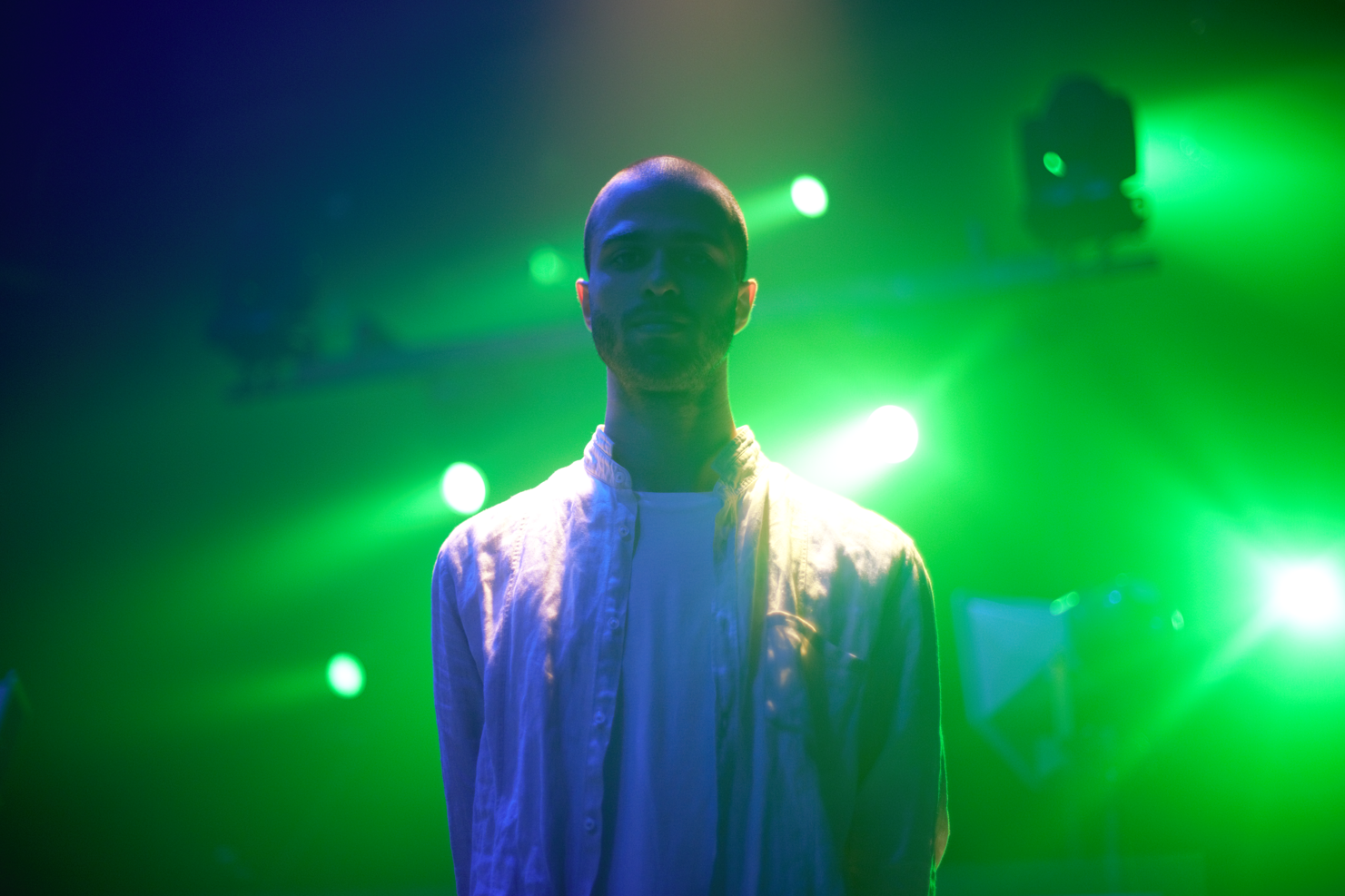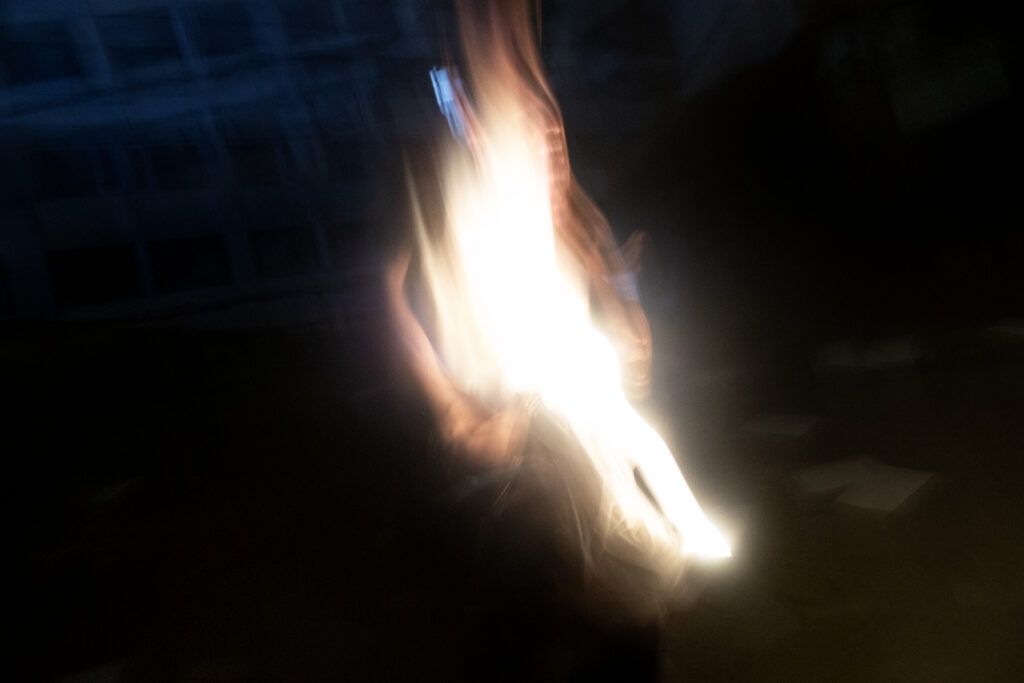
Zesknel is the alias of Georgian musician Zurab Babunashvili. Zesknel’s performances focus on live improvisation, ranging from slowly evolving textured soundscapes to drum-oriented polymetric explorations to looped vocal manipulations; a mix of unpredictable disruptions and conditions – integrated into a single outcome. These intuitively constructed shows are based on ‘in-the-moment’ perceptions and rhythmic adventures, attempting to create a ritualistic unity out of sometimes distorted, often dynamic, and abstract sounds. Zurab is a resident at the Tbilisi club Bassiani, where he holds monthly live sessions that sometimes last up to several hours. He is also a resident at the radio platform Mutant Radio.
Can you talk about your background and how you got into music?
Both my parents were, and still are, avid music listeners. I was surrounded by music like the Beatles, King Crimson, Nine Inch Nails, Miles Davis, Frank Zappa, etc. from an early age. I listened to and found new music throughout my teenage years, and then, at the age of 18 (I’m trying to remember now after listening to a podcast series called Secret Thirteen), I decided to try making music myself and downloaded Ableton.
Air vibrating with a full frequency spectrum, intuitive sounds: cathartic, rhythmic, polytonal, sub bass heavy…are some of the words used to describe your music. How do you construct it?
This description applies to my recordings as well, but mainly focuses on my live performances. Although in both instances, I find that: The word rhythmic applies because I almost always have a drum machine with me or a contact mic that I can loop up to make a rhythm. I guess anything can be a rhythm while still being a vibration, so it’s a descriptor that’s hard to get away from;
Low frequencies are quite important – feeling the subs and the air vibrating, especially in the last couple of years;
Polytonality is a thing I embrace, specifically because I don’t know music theory so it’s a given that I play by ear;
Catharsis may be a ‘loud’ word, but I sometimes find myself quite lost in a performance and that free-floating experience is a thing I cherish;
In terms of construction, live performances are a hybrid of a drum machine, various microphones, pedals and analogue feedback techniques on a mixer. For recorded music, both software instruments and acoustic sources are used, as well as the aforementioned instruments and resampling in the box ad infinitum until a structure emerges.

How important is the live, “in the moment” element to your music and improvisation?
Live improvisation, or intuitive playing, was a choice I made after playing my first live set with a computer and knowing exactly what was coming next; it was basically a way to avoid being too bored with it. Afterwards, I started by acquiring a drum machine and pedals and slowly got rid of any roadmap for the performance. Adapting to the situation, my emotional state, the space I’m in, or any other detail seems like an invaluable technique to me. I’m slowly getting faster at making decisions on the spot. Improvised music has been a fascinating area for me to explore – following sounds and my ear rather than going in with preconceived ideas.
Nowadays, it’s a couple of patterns made days before or during the soundcheck on the drum machine, a couple of microphones, a looper, and analogue feedback techniques on the mixer. It’s almost not a question of form anymore, it feels more like a question that opens up possibilities for new and different experiences.
How do you build the dramaturgy of your live sets? Do you perceive a beginning and an end, or is it more of a free-floating amalgam of sound?
No plans or dramaturgy to speak of. I find music and other art forms that do not have a clear-cut script to be interesting. I feel that the dramaturgy is built inside of the listener’s mind and body. Perceiving it as something understandable is a different story.
You are also closely connected to Tbilisi’s Bassiani club, where you hold a monthly residency, and to Mutant Radio. Could you talk about your residency and your collaboration with the radio?
Being able to play in front of people every month at Bassiani, in a big (or smaller) room with a great sound system, is an opportunity for which I’m very grateful. Apart from all the people who work there, I would like to thank my friend Tato for always trusting me and understanding my (sometimes blurry) musical vision. Cutting my teeth at Bassiani is a gift I will always cherish. Playing live every month is not only a gift, as I just mentioned, but also one of the best ways to ‘train’ in more attentive listening/improvisation and get used to playing at high sound pressure levels and in front of people that I could wish for.
My favourite time/space to play is doing the opening on the main floor of Bassiani’s for 3-4 hours and making the room reverberate from the moment it’s empty to the moment it’s packed at 4am. Mutant Radio is a place that encourages experimentation. It’s a meeting place for those working here in Tbilisi and interesting artists from different countries. There has never been a space like this before in Tbilisi. It offers a wide range of music as well as workshops and events touching on interesting, obscure and crucially important topics around music, art, architecture, and more. Thanks to Nina and Tata for letting me be part of the big community. I’m happy to travel with them to other countries for showcases and to meet other radio platforms, people from important cultural institutions as well as their residents from all over the world. More and even better things are coming in the future! Through these places, I have met, befriended and collaborated with amazing people. Thanks to both of these spaces for the trust. If you’re in Tbilisi, check out both of them, you might find something you didn’t know you
were looking for.
Tbilisi’s music scene has been very active and is gaining recognition outside of the country too – also because of its political stance. What is the situation on the scene nowadays?
Always politically charged and basically anti-establishment – at least among the musicians I know and am acquainted with. While music (for me) has no intrinsic meaning and cannot have a clear political stance because of its ambiguous nature, social activism and performing music go hand in hand here. I cannot close my eyes or ears to the class struggles all around me. Although not in a clear way, this does affect how or what I perform. Although Tbilisi is “famous” for the “rave” in front of the parliament a couple of years back, etc. art always answers (or rather poses more questions) to people who are searching. The questions are significant for everyday life.
This is a big topic, I feel like it needs (as well as all of the others) a face-to-face conversation
What are your current projects?
I’m working on setting up a label for my own music (for the time being). Different aliases, directions, etc. I’ve been busy with theatre work for the last two years and these past couple of months have been intense. I’ve been creating improvised sound for a play as well as more rigidly structured music. Definitely a space I will explore more. As for the next few days – I have sessions with friends and will be finalising some label logistics.
Interview Lucia Udvardyova